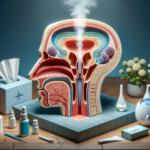Introduction to Stuffy Nose
A stuffy nose, often perceived as a minor inconvenience, can significantly impact daily life by affecting sleep, concentration, and overall comfort. Understanding the causes and remedies for a stuffy nose is essential for effective relief. This article delves into the various aspects of nasal congestion, exploring its causes, symptoms, and potential treatments.
Causes of a Stuffy Nose
Nasal congestion can result from a variety of factors, each with its own set of triggers and underlying mechanisms. Common causes include:
- Allergies: Allergic reactions to pollen, dust, pet dander, and other allergens can lead to inflammation of the nasal passages.
- Infections: Viruses such as the common cold or flu are frequent culprits, causing the nasal lining to swell and produce excess mucus.
- Environmental Irritants: Smoke, strong odors, and pollution can irritate the nasal passages, leading to congestion.
- Structural Issues: Deviated septum or nasal polyps can physically obstruct airflow, resulting in a stuffy nose.
Identifying the root cause is crucial for determining the appropriate treatment and achieving relief.
Symptoms and Diagnosis
While a stuffy nose is a common symptom, it often comes with additional signs that can help pinpoint the underlying issue. These symptoms may include:
- Runny Nose: Often accompanies congestion, especially in cases of colds and allergies.
- Sneezing: Frequent sneezing is a hallmark of allergic reactions.
- Sinus Pressure: A feeling of pressure around the nose, eyes, and forehead may indicate sinusitis.
- Difficulty Breathing: Severe congestion can lead to breathing difficulties, particularly during sleep.
For a definitive diagnosis, medical professionals may conduct physical examinations, allergy tests, or imaging studies to identify structural abnormalities.
Treatment Options
Addressing a stuffy nose involves both over-the-counter remedies and lifestyle adjustments. Effective treatments include:
- Decongestants: These medications reduce swelling in the nasal passages, providing temporary relief.
- Antihistamines: Useful for allergy-induced congestion, they block the effects of histamines in the body.
- Nasal Sprays: Saline sprays help moisten the nasal passages, while medicated sprays reduce inflammation.
- Home Remedies: Staying hydrated, using a humidifier, and inhaling steam can alleviate symptoms.
Choosing the right treatment depends on the cause of congestion, and consulting with a healthcare provider is advisable for persistent symptoms.
Prevention and Lifestyle Tips
Preventing a stuffy nose involves minimizing exposure to known triggers and maintaining a healthy lifestyle. Consider the following tips:
- Manage Allergies: Use air purifiers, keep windows closed during high pollen seasons, and regularly clean bedding.
- Avoid Irritants: Stay away from smoke and strong chemicals that can irritate the nasal passages.
- Stay Hydrated: Drinking plenty of water helps thin mucus, making it easier to expel.
- Practice Good Hygiene: Regular hand washing can prevent the spread of infections that cause congestion.
Incorporating these habits into daily routines can reduce the frequency and severity of nasal congestion episodes.








